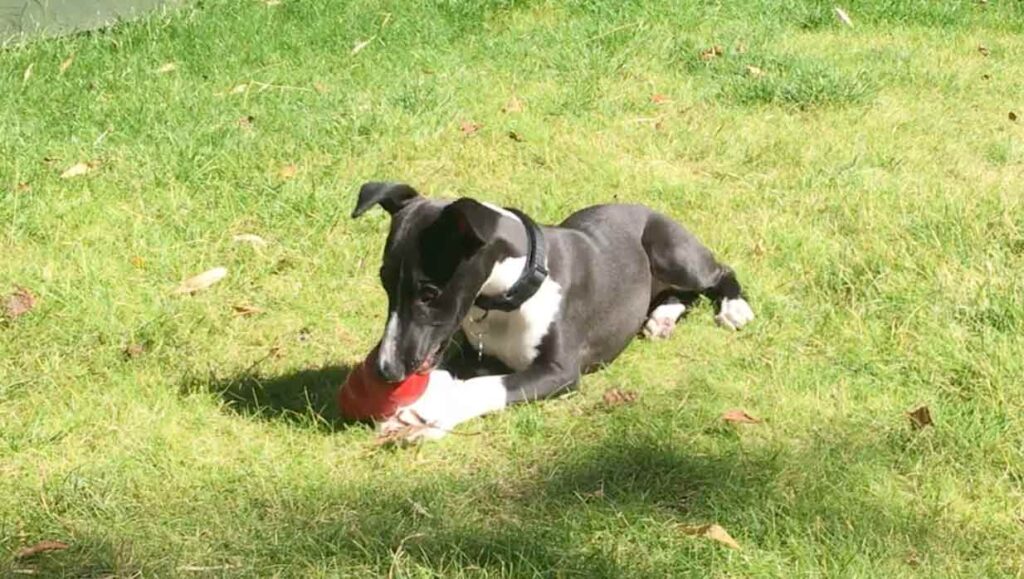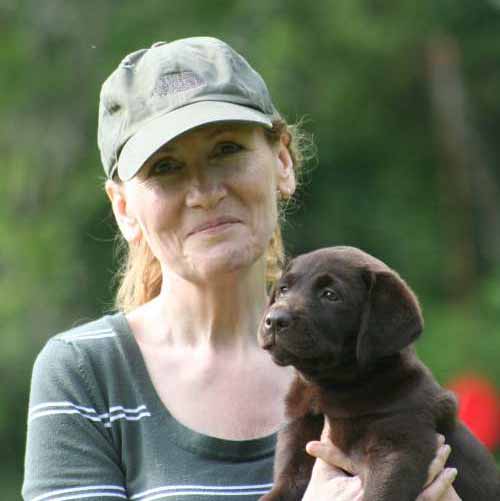It’s common to see new puppy parents advised to teach their puppy the word NO from an early stage. As a starting point for obedience training.

We don’t advise this. In fact we advise quite the opposite. We recommend you teach your puppy the word YES. And I’ll explain that in a moment.
But why don’t we like to teach puppies the word NO? To answer that question, we need to look at what makes puppies do the things they do.
Why does my puppy do that?
Puppies are curious, and for the first few weeks they are naive. In that they assume nothing, and try everything. At least once!
The first time a puppy does something, whether that something is biting a bee, sniffing a rock, or chasing after their human friends, there can be only one of three possible outcomes.
- Something bad happens
- Nothing of any significance happens
- Something good happens
Dogs repeat behaviors that have been reinforced (something good happened) in the past. And they avoid repeating behaviors that have been punished (something bad happened) in the past.
They also avoid repeating behaviors that did not benefit them in any way (nothing of significance happened).
So if your puppy gets to feel safe, or even better, gets a treat for running after you (reinforcement), they’re going to run after you again. And if sniffing a rock doesn’t change anything, they will lose interest in sniffing that rock. And if the bee stings them (punishment), well we all know how that goes.
Note that the bee sting is a punishment in that it leads to the puppy avoiding that behavior in the future. Even though the bee isn’t trying to train your dog, environmental outcomes are very important factors in behavior change.
Understanding these three outcomes, is what lies at the heart of behavior change. And training is essentially us (humans in general) taking deliberate control of our dog’s behavior change.
Taking control
When a puppy does something you want them to repeat, you need to reinforce that behavior with a reward. That much is obvious. But what to do when the puppy misbehaves is a little less clear.
Because when the puppy does something you definitely do NOT want them to repeat, there are two different paths you could take. You could either punish the puppy, or you could make sure that the behavior does not benefit them in any way at all.
So why do modern dog trainers recommend you make the latter choice and opt for ensuring bad behaviors do not benefit your puppy, rather than simply punishing them?
Should I punish my puppy?
There are some very good reasons why we no longer use punishment as a first resort in dog training. And why many modern dog trainers don’t use punishment at all.
And when I say ‘punishment’ I’m not just talking about physical, or painful punishment. I’m talking about anything that the dog finds aversive and that therefore inhibits a repeat of the same behavior.
Practical considerations
One reason we don’t use punishment any more is simply that punishment is not always practical.
Just like reinforcement, for punishment to be effective it needs to take place immediately.
But puppies are slippery, wriggly, and quick! And the naughty behavior often takes place when they are not within reach.
Building trust
There are several much more important reasons to avoid punishment.
One is that punishment damages the puppy’s confidence and their trust in us.
Making it much harder to establish a good recall, and build a great bond with your dog.
Avoiding aggression
Another is that punishment raises the risk of the dog becoming aggressive.
This has been well established in scientific studies and applies even if the punishment is not physical!
Learning new things
Punishment also works against us when we want to teach a dog more complex behaviors.
That’s because a dog that is punished when they get something wrong, tends to avoid offering new or different behaviors, in the future.
If you put your hand up in class and the teacher tells you that you are stupid when you get the answer wrong, you are probably not going to put your hand up next time. Whereas if they say “good try” you might have another go.
New behaviors, freely offered by your dog, are an essential part of training more advanced and more interesting skills. And your dog needs to be confident in your benevolent response in order to keep those new behaviors coming
Treating dogs well
We all want to treat our dogs well. And almost no-one sets out to be cruel or unkind to their dog.
But punishment has a nasty way of escalating, because dogs become tougher and more resistant to it as they mature.
This can result in an upward spiral of increasingly harsh punishment that the dog owner struggles to break out from.
For this reason above all else, it is so important that all puppy parents learn to train their dogs without force, right from the very start.
Which brings me back to the question we asked at the very beginning. Why don’t we teach puppies what the word NO means.
What does NO mean to a puppy
When you say NO to your puppy, you need to consider what you want the word to mean, versus what it actually does mean to your dog.
Probably, you want the word to mean ‘stop doing that now’. But we know that there are only two ways to stop unwanted behaviors, one is punishment, and the other is to ensure that behavior has no significant benefit.
Let’s say your puppy is digging in your flower bed.
To stop them doing that, you need to either punish the behavior, or make sure that the behavior is not rewarding
Unfortunately digging in the flowerbed has a huge benefit for your puppy because they enjoy it immensely. Digging itself is very rewarding for puppies. So if your puppy is digging, unlike the rock sniffing we used as an example, the puppy will carry on being reinforced for its behavior.
And because the naive puppy has no idea that the word NO means ‘stop doing that’. They carry on digging, delighted that you have come to join them.
NO as a marker
What actually happens at this point is that most puppy parents turn the word NO into a marker. A marker for punishment.
So they say the word NO, and then punish the puppy with a verbal reprimand “Arrgggh, bad puppy” or a scruff shake, or even a smack.
After a few repetitions, when your puppy hears the word NO, they simply believe it means, “look out, you are about to get punished”
And leaving aside all those reasons not to use punishment that we looked at above, a smart puppy quickly learns to make themselves scarce whenever they hear the word NO.
What you end up with, is a puppy that runs away when they hear the word NO. Or when they hear you speak in a similar tone. The puppy soon associates that word with your demeanour, your expression, and a whole host of contexts that you never intended, that trigger your puppy into hiding or running away from you.
So let’s not do that!
Training without punishment
Instead, let’s take a step back and look at the bigger picture.
To train without punishment, we need to focus on teaching the behaviors we want our puppy to repeat, such as paying attention, looking for us, or coming to us.
And we need to use some simple management techniques that help us to prevent the puppy reinforcing themselves for bad or naughty behaviors during the training process.
Such as creating a puppy zone within the home, and having the puppy drag a houseline indoors and out.
This enables you to restrain the puppy and move them away from behaviors that are self reinforcing (such as digging in the flower beds, or ripping up the couch) so that we can then distract the puppy and reinforce them purposefully for doing something more appropriate.
Why we teach puppies the word YES
The word YES is hugely important in puppy discipline. It lets the puppy know that they did a good thing and that a reward is about to be delivered. We call it the ‘puppy promise’.
Puppies want to please you, and the puppy promise shows them how to do that.
Next time your puppy looks at you, say “YES” and give them a tiny piece of food.
Keep food within reach all the time while your puppy is small so that you can reward lots of great behaviors such as paying attention, sitting to say please, keeping paws on the floor, and so on.
So often people associate the word discipline with punishment and it’s common for puppy parents to believe that if they do not punish their puppy, the pup will end up spoiled and naughty.
Thankfully this simply isn’t true.
And the best way to look at puppy discipline is to think of the true origins of the word discipline, which are to do with learning, and knowledge.
The more often you reward your puppy, the faster they will learn! And the quicker they will acquire the most valuable knowledge that any dog can have, and that’s how to get what they want, by pleasing you!
For more information check out these articles:
- First Steps In Dog Training For All Dogs Young And Old
- Changing Dog Behavior One Game At A Time
- Teach Your Dog To Pay Attention
- Game Based Dog Training Explained

Free Training Tips
Get Pippa's free dog training tips delivered to your inbox

 Measuring Your Dog’s Progress Can Be Very Motivating!
Measuring Your Dog’s Progress Can Be Very Motivating!
Thank you, Pippa, so very much for your lesson on why “Yes” is far more productive, kind, and helps our pups learn than “No”!
I’ve been hearing about ceasing to use negative techniques, yet could not wrap my head around dispensing with “No”.
I feel blessed now that you showed me “Yes”!